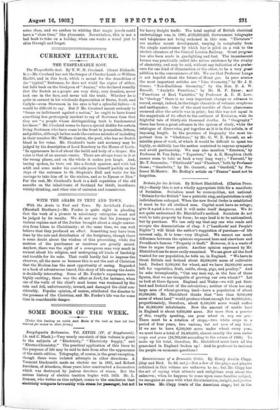C URRENT LITERATURE.
THE UNSPEAKABLE SCOT.
The Unspeakable Scot. By T. W. H. Crosland. (Grant Richards. 5s.)—Mr. Crosland has not the temper of Charles Lamb or William Hazlitt, and in this book, which is meant for the demolition of the "typical" Scotsman, he does not wield the rapier of either, but falls back on the bludgeon of "Junius," who declared roundly that the Scotch as a people are very dirty, very drunken, never look one in the face, and never tell the truth. Whether he is quite in earnest in his wholesale depreciation of Burns, Scott, and Carlyle—even Stevenson in his eyes is but a splendid failure—it would be difficult to say. But if Mr. Crosland meant seriously to "frame an indictment against a nation," he ought to have found something less grotesquely insolent to say of Scotsmen than that they are " a people whose distinguishing trait is fundamental lewdness." Mr. Crosland seems to have a special dislike for certain living Scotsmen who have come to the front in journalism, letters, and politics, although he has made the curious mistake of including in their number Mr. William Canton, the poet, who has no Scotch blood in his veins. Mr. Crosland's taste and accuracy may be judged by his description of Lord Rosebery in the House of Lords. "In appearance he is of about the build and body of a draper. His voice is that of an anemic curate. There are always tears in it at the wrong places, and on the whole it makes you laugh. And, having spoken, he trots out like a Scotch sparrow, and with hat 1-tilt and arms under his coat-tails poses himself perkily on the steps of the entrance to St. Stephen's Hall and waits for his carriage to take him off to the station, and so to Epsom or Nice." For the rest, Mr. Crosland's book is a dull repetition of the old assaults on the inhabitants of Scotland for thrift, inordinate whisky-drinking, and other sins of omission and commission.


































 Previous page
Previous page